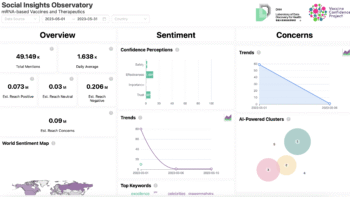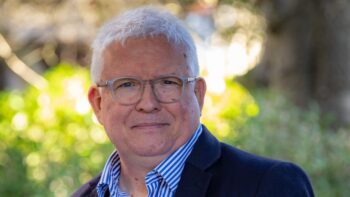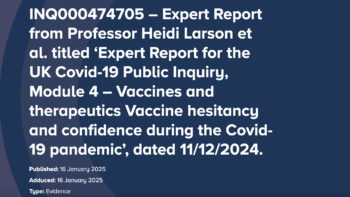A lot of people have genuine and legitimate questions and “you’re going to lose them if you immediately jump back and say ‘that’s silly’ or ‘that’s not the fact’”, says VCP founder Heidi J. Larson.


A lot of people have genuine and legitimate questions and “you’re going to lose them if you immediately jump back and say ‘that’s silly’ or ‘that’s not the fact’”, says VCP founder Heidi J. Larson.

We conducted a social listening analysis to assess attitudes towards mRNA vaccines and therapeutics on Twitter from June 2022 to May 2023. Our findings reveal widespread negative sentiment and a global lack of confidence in mRNA vaccines and therapeutics, with frequent discussions of severe vaccine side effects, rumors, and misinformation.

We conducted a social listening analysis to assess attitudes towards mRNA vaccines and therapeutics on Twitter from June 2022 to May 2023.

Join us for the LSHTM Vaccine Centre’s Annual Lecture with Professor Stephan Lewandowsky, exploring practical tools to address vaccine hesitancy. Discover the Empathetic Refutational Interview (ERI) — a proven, human-centred approach for building trust and countering misinformation.
19 May 2025 | 17:30 BST | John Snow Lecture Theatre A

This paper offers two scenarios to argue for the possibilities of building trust during crises by engaging with existing distrust, with special reference to examples during the COVID-19 pandemic.

A new 70-country survey by The Global Listening Project, the VCP’s sister initiative, reveals that while people are demanding better healthcare and more information, trust in vaccines and institutions has declined in 9 out of 10 countries. Professor Heidi Larson speaks to Vaccines Today about the legacy of the COVID-19 pandemic on vaccine uptake.

“A lot of people had no clue how toxic the [vaccine misinformation] environment was,” says Heidi Larson, who studies vaccine hesitancy at the London School of Hygiene & Tropical Medicine. “People who were taking vaccines for granted got exposed [to misinformation], and now there’s no turning back.”

In the oil towns of west Texas, a measles outbreak is spreading. Gaines County, where the flare-up began, had the state’s third-highest share of children exempt from measles and other vaccines for religious or philosophical reasons last year

The way to discuss a vaccine, says Prof. Heidi Larson, founding director of the Vaccine Confidence Project, is to ask your patient how they feel about it and go from there, addressing patient concerns and developing a risk-benefit analysis to discuss.

VCP Director Professor Heidi Larson and VCP team members Dr Alexandre de Figueiredo, Caitlin Jarrett and Rachel
Eagan authored an expert report for the UK Covid-19 Public Inquiry on vaccine hesitancy and confidence during the Covid-19 pandemic.

This series of studies highlights the importance of adopting constructive approaches to restoring public health confidence in vaccination, particularly mRNA vaccines.

Professor Heidi Larson spoke to The i Paper about the role of the Covid pandemic in driving vaccine confidence declines among 18 to 24-year-olds: “It was not specifically a reaction to the vaccine. They felt that their education was disrupted, social life restricted and jobs lost or disrupted.”